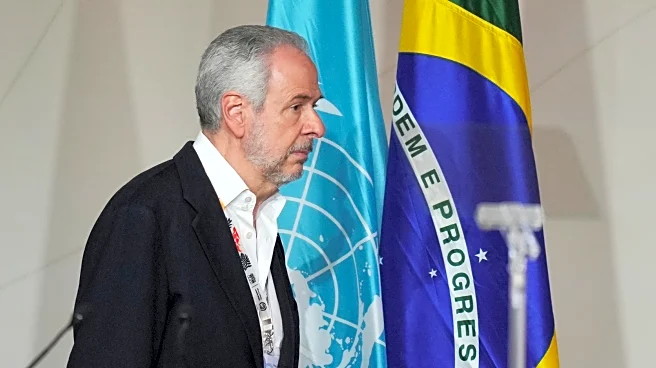BELEM, Brazil (AP) — After two weeks of negotiations, this year's United Nations climate talks ended Saturday with a compromise that some criticized as weak and others called progress.
The deal finalized at the COP30 conference pledges more money to help countries adapt to climate change, but lacks explicit plans to transition away from the fossil fuels such as oil, coal and gas that heat the planet.
The conference didn't do as much as scientists thought
the world needed. It wasn't as meaningful as activists and Indigenous people demanded. Few countries got everything they wanted. And the venue even caught fire.
But that disappointment is mixed with a few wins and the hope for countries to make more progress next year.
Here's what you need to know about the outcome.
Leaders have been working on how to fight the impacts of climate change, such as extreme weather and sea level rise, for a decade. To do that, every country had the homework of writing up their own national climate plans and then reconvened this month to see if it was enough.
Most didn't get a good grade and some haven't even turned it in.
Brazil, host of the climate conference known as COP30, was trying to get them to cooperate on the toughest issues like climate-related trade restrictions, funding for climate solutions, national climate-fighting plans and more transparency on measuring those plans' progress.
More than 80 countries tried to introduce a detailed guide to phase out fossil fuels over the next several decades. There were other to-do items on topics including deforestation, gender and farming.
Nations agreed to triple the amount of money promised to help the vulnerable countries adapt to climate change. But they will take five more years to do it. Some vulnerable island countries said they were happy about the financial support.
But the final document didn't include a road map away from fossil fuels, angering many.
After the agreement was reached, COP President André Corrêa do Lago said Brazil would take an extra step and write their own road map. Not all countries signed up to this, but those on board will meet next year to specifically talk about the fossil fuel phase out. It would not carry the same weight as something agreed to at the conference.
Also included in the package were smaller agreements on energy grids and biofuels.
“Given what we expected, what we came out with, we were happy,” said Ilana Seid, chair of the Alliance of Small Island States.
But others felt discouraged. Heated exchanges took place during the conference’s final meeting as countries snipped at each other about the fossil fuel plan.
“I will be brutally honest: The COP and the U.N. system are not working for you. They have never really worked for you. And today, they are failing you at a historic scale,” said Juan Carlos Monterrey Gomez, a negotiator for Panama.
Jiwoh Abdulai, Sierra Leone’s environment and climate change minister said: “COP30 has not delivered everything Africa asked for, but it has moved the needle.” He added: "This is a floor, not a ceiling.”
The real outcome of this year’s climate talks will be judged on “how quickly these words turn into real projects that protect lives and livelihoods,” he said.
Participants experienced the Amazon’s extreme heat and humidity and heavy rains that flooded walkways. Organizers who chose Belem, on the edge of the rainforest, as the host city had intended for countries to experience firsthand what was at stake with climate change, and take bold action to stop it.
But afterward, critics said the deal shows how hard it is to find global cooperation on issues that affect everyone, most of all people in poverty, Indigenous people, women and children around the world.
“At the start of this COP, there was this high level of ambition. We started with a bang, but we ended with a whimper of disappointment," said former Philippine negotiator Jasper Inventor, now at Greenpeace International.
One of the nicknames for the climate talks in Brazil was the “Indigenous peoples' COP.” Yet some in those groups said they had to fight to be heard.
Protesters from Indigenous groups twice disrupted the conference to demand a bigger seat at the table. While Indigenous people's rights weren't officially on the agenda, Taily Terena, an Indigenous woman from the Terena nation in Brazil, said so far she is happy with the text because for the first time it includes a paragraph mentioning Indigenous rights.
She supported countries speaking up on procedural issues because that’s how multilateralism works. “It’s kind of chaotic, but from our perspective, it’s kind of good that some countries have a reaction,” she said.
___
The Associated Press’ climate and environmental coverage receives financial support from multiple private foundations. AP is solely responsible for all content. Find AP’s standards for working with philanthropies, a list of supporters and funded coverage areas at AP.org.
___
This story was produced as part of the 2025 Climate Change Media Partnership, a journalism fellowship organized by Internews’ Earth Journalism Network and the Stanley Center for Peace and Security.















